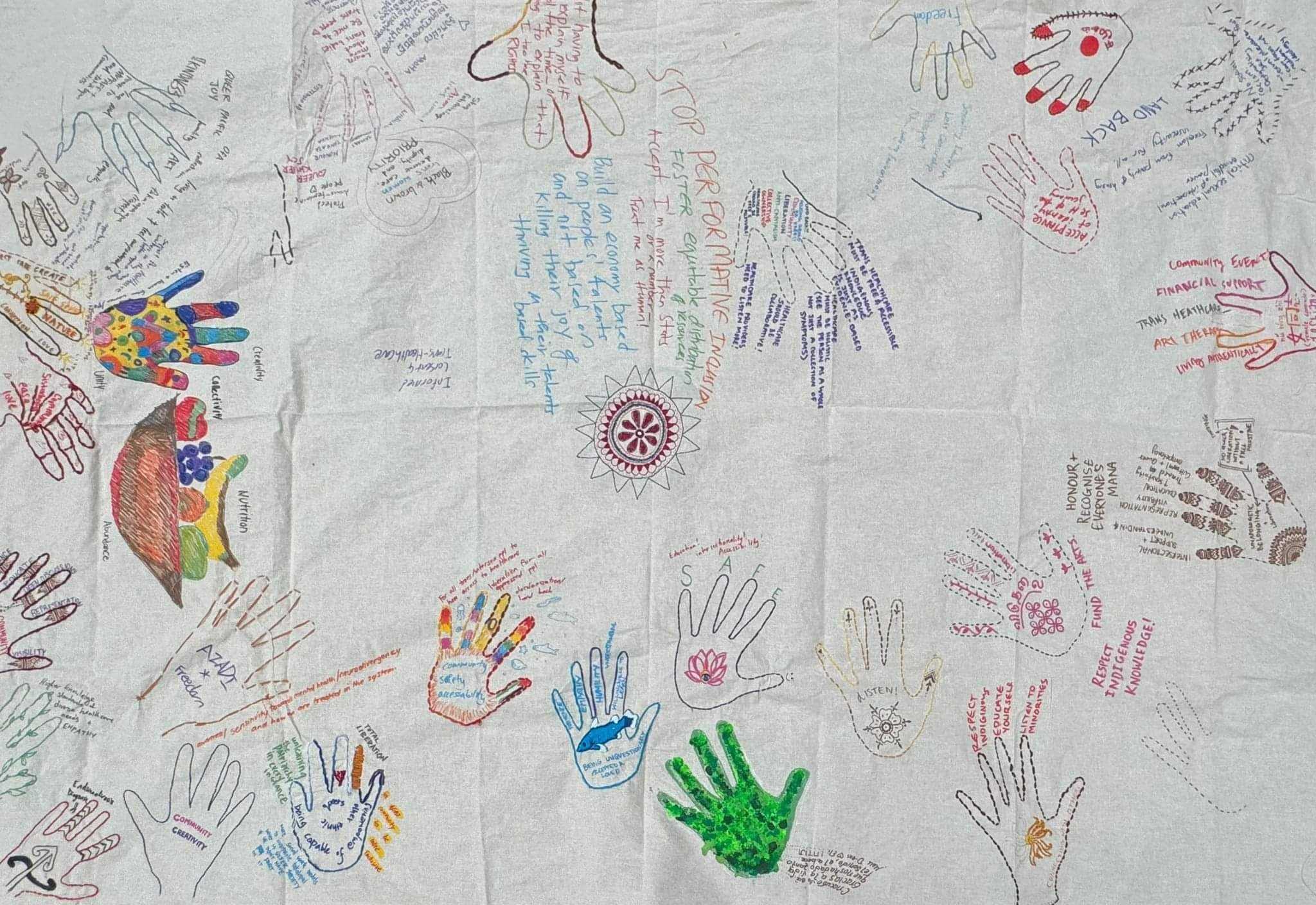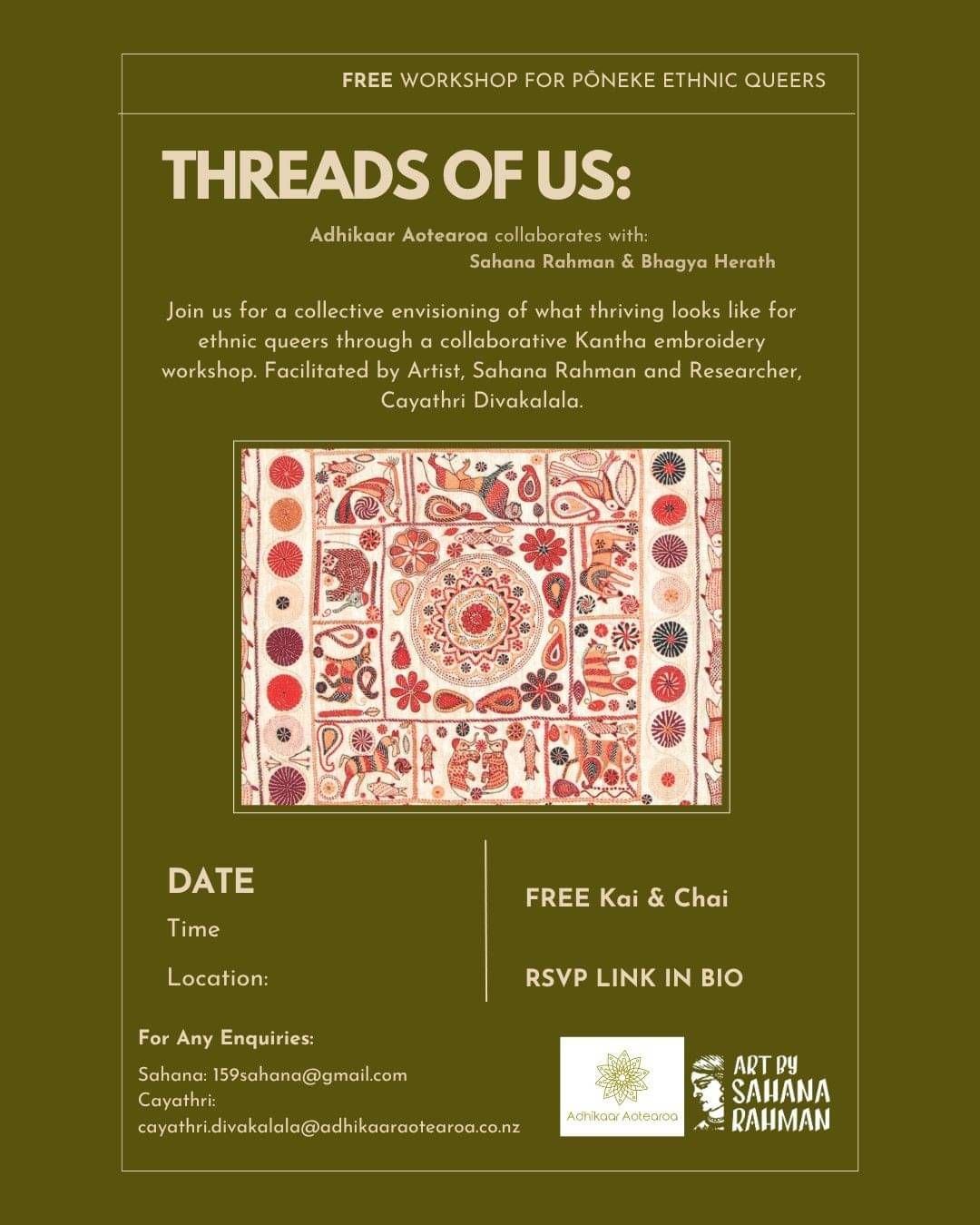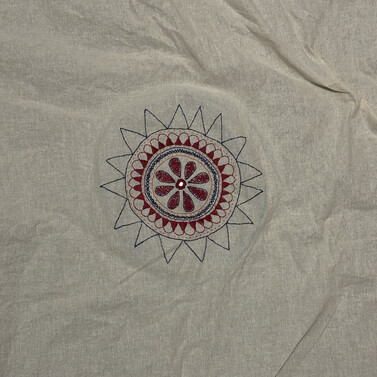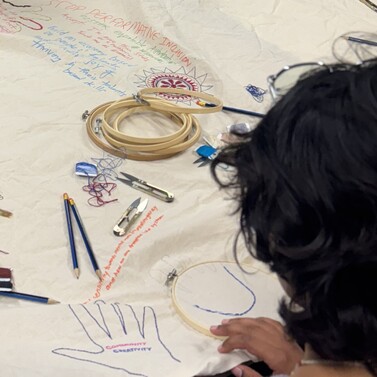Threads of Us
Weaving Care and Resistance
Threads of Us is a living, breathing community arts initiative that interlaces creative expression, cultural identity, and collective healing within queer and people-of-colour (POC) communities across Aotearoa.

Co-designed and co-facilitated by artist Sahana Rahman and researcher/community advocate Cayathri Divakalala (known as Caya, a name given to her by friends from the South Asian region), this work began as a series of workshops designed to hold space for queer, trans, and POC.
Through these embodied gatherings, participants explore the art of embroidery called Nakshi Kantha as both metaphor and method: a slow, tactile practice through which we stitch our individual narratives into a shared fabric of resistance and care. In this space, art is not decoration. It is resistance, reflection, advocacy, and reclamation. A way of remembering, healing, and imagining futures together.
Introducing the Artist: Sahana’s Story
“My name is Sahana Rahman, and I am a Painter, Textile and Community Artist of Bangladeshi and Sri Lankan Tamil heritage. Born and raised in Te Whanganui-a-Tara, and graduated with a BFA (Hons) degree from Massey University in 2022.
My work reflects on the complexities of life as a brown queer person, connected with memory, healing and decolonisation through a unique blending of South Asian style embroidery and Mughal miniature painting. I layer textures with mirrors, brass charms and an earthy colour palette to reflect my diasporic identity.
In 2022, I founded the “Nokshi Kotha Workshop” (Sahana’s twist to the Nakshi Kantha embroidery tradition) in response to my post-pandemic social anxiety. The workshop gently encourages socialising through “Nokshi Kantha”, a fading Bengali embroidery tradition that I’m hoping to revive. Over 200+ participants from 20+ workshops have contributed to the embroidered mural, creating space for shared conversation, collective healing and joy”
Sahana and Caya’s friendship, grounded in a shared desire to co-create for their communities, laid the foundation for Threads of Us. What began as Sahana’s intimate artistic journey of reconnecting with her heritage and exploring belonging through art evolved into a collective expression of queer joy, cultural reclamation, and community care. This echoed the spirit of the collaborative community work Caya has been part of since the 1990s, and has gone on to lead since the 2000s, across regions shaped by civil war, conflict, destruction, and discrimination. Together, their lived experiences and expertise became the bridge that transformed an intimate practice into a nationwide collaboration, facilitated by Adhikaar Aotearoa, now known as Threads of Us.
Threads of Us: Collaboration and Co-creation
“Over the past few months, I’ve had the privilege of co-facilitating with Cayathri Divakalala from Adhikaar Aotearoa on a series of ethnic queer workshops called Threads of Us. Together we bring our culturally inclusive space to discuss our experiences with healthcare and service providers and ways they can improve for us. These workshops combined my artistic practice rooted in “Nokshi Kantha” Bengali embroidery with Cayathri’s experience in ethnic queer advocacy and facilitation.
Together, we co-designed and led workshops that centred the voices of ethnic queer’s in a safe, slow-paced, creative environment. Participants traced and stitched their hands onto the kantha fabric, wrote reflections on healthcare and service providers in their palms and towards the embroidered sun motif (symbolising the life force in Nokshi Kantha). These workshops offered creative expression alongside emotional support and cultural connection through shared experiences. Holding space for ethnic queer people is vital, as we are often marginalised within both mainstream queer and ethnic communities.”
Sahana’s words capture the essence of what Threads of Us strives to embody. It is a space that is both gentle and radical, creative, and deeply political. It bridges art and advocacy, making visible the often-unseen experiences of ethnic queer communities navigating systemic inequities.
The Thread Begins
The first Threads of Us workshop was a closed group one at the request of some members of our communities. The second was held in Tāmaki Makaurau, with generous support from the Ethnic Rainbow Community (ERC) at Waipapa Taumata Rau University of Auckland.
From the beginning, it was clear this was not simply a creative exercise. It was a weaving of communities that rarely find space to gather, be themselves, and share joy safely.
Participant reflections, particularly from Simran Saini, illuminate how the project cultivated one of the few explicitly queer and POC-centred environments in Aotearoa, which is a rare and essential protection for those navigating multiple forms of marginalisation. As they described, it was a space where participants could “feel safe in ways queer spaces and South Asian spaces often do not.”
That feeling of being both seen and held lies at the heart of Threads of Us. It reminds us that safety is not a passive condition but an active, collective practice. It is woven through trust, reciprocity, and the courage to show up as our full selves.
Following the Tāmaki Makaurau workshops, Threads of Us travelled to Pōneke Wellington in collaboration with Bhagya Herath and 13GarretStreet. These gatherings were enriched by laughter, shared stories, and shared meals. They reaffirmed that creativity and nourishment go hand in hand.
A particularly memorable evening featured Sri Lankan vegan string hopper koththu with sambal, lovingly prepared by Sri Lankan Taste in Welly (highly recommended), organised by Bhagya. Food, in that moment, became another thread of care, reminding us that healing often begins in the everyday through shared flavours and conversations.
According to Nimasha, echoing many others, “The workshop felt like home. It was the first time I had been around so many people like me, and I felt like I had found my family. What a privilege it is to be surrounded by a community that understands and accepts you. The kai and kōrero, while embroidering, left me feeling so full and connected.”
Sahana Reflected: “As an ethnic queer myself, who grew up navigating contrasting identities and often felt isolated in my experiences with healthcare providers, these spaces have been profoundly healing. Facilitating and listening to the conversations that unfold in each workshop as we stitched onto the kantha has given me so much joy and queer affirmation like never before and I have gotten similar feedback from participants themselves. They express a sense of safety and belonging knowing they’re not alone in their experiences. The participants have even continued the kaupapa by staying connected beyond the workshop, which shows the impact of this work. Together, we create a space where our shared identities are honoured and that healing happens collectively through conversation, creativity, and community.”
The next stops for Threads of Us are Ōtepoti Dunedin, Kirikiriroa Hamilton, Ahuriri Napier, Ōtautahi Christchurch…. (funding dependent), as the project continues to travel across the motu, weaving connections between communities that might never otherwise meet. It will continue to evolve.
A Living Philosophy
Threads of Us stands out for its intentional philosophical grounding in community action. In Simran’s words: “From a theoretical perspective, I find it helpful to use Foucault’s concept of pouvoir-savoir and the new conditions of possibility that become apparent when we create spaces that are alternative to hegemonic norms within a society. The space created a renewed sense of hope and joy within me as I realised the potential for new kinds of community that could form in ways that centre my ethnic and queer experiences as opposed to considering them “diversity tick boxes” or “add ons” to existing space. The experience really showed me that community has the power to come together and create the spaces we need -as evidenced by Adhikaar Aotearoa’s act of resisting traditional knowledge forms/putting money towards community connection first; Sahana’s story of finding her craft; and the stories shared by the ethnic queer university group about their fight for recognition.”
In this sense, Threads of Us is not merely a series of creative workshops. It is a counter-space, one that resists hegemonic norms and re-imagines what it means to create and to belong outside the boundaries of colonial and normative expectations.
The work sits firmly within decolonial and queer-of-colour frameworks, recognising that liberation is not achieved through separation but through interdependence. Here, theory and practice intertwine. The philosophical becomes tactile, the political becomes personal (they were never mutually exclusive), and art becomes a method of worldmaking. A pattern observed in many struggles and liberation movements across the world.
Embroidery as Practice, Embodiment as Healing
In the spaces I, Caya, co-create, the process of Nakshi Kantha embroidery is both symbolic and practical. It is a living metaphor for connection, care, and collective becoming. Together, participants trace their hands onto fabric and embroider those outlines into a shared Nakshi Kantha. Each stitch carries intention. It holds both individuality and interdependence, a quiet but radical act of presence.
To embroid alongside one another is to participate in a politics of tenderness. It is to affirm, “I am here. We are here. We belong to this fabric of us.”
Guided by over two decades of experience in community-enhancing advocacy roles, my facilitation is grounded in principles of healing-focused practice, cultural safety, and collective care. Through mindful, repetitive acts of making, participants find grounding and relational connection.
In this way, embroidery becomes more than an art form. It becomes a shared practice of healing. Each thread re-stitches stories of self, belonging, and community. Each gathering becomes an act of resistance, reflection, and reimagining what wellbeing can look like when shaped by our own hands, voices, and collective rhythms of joy.
Simran’s reflections describe this beautifully, “I felt encouraged and comfortable in my skin, my queer racialised experiences of life, and crucially, the political ideology by which I make sense of my world (e.g. understand the oppressive systems of racism, imperialism, colonialism, patriarchy, binary gender, transphobia, homophobia etc.). It felt like a space I could be ‘me’ in, without fear of judgement for my ‘otherness’.”
In these moments, artmaking and emotional healing are indistinguishable. Threads of Us becomes an act of community care as much as artistic creation.
Evolving Through Reflection
No community is static, and Threads of Us honours that truth. The project is committed to critical self-reflection and inclusive growth, continually expanding to embrace a wider spectrum of experiences and identities.
Simran and other participants have noted the importance of broadening representation beyond dominant diasporic groups, ensuring that workshops remain accessible across gender expressions, ethnicities, and lived realities. This reflexivity and the willingness to learn, adapt, and evolve are marks of the project’s integrity and sustainability.
Each workshop becomes both a creative process and a feedback loop, allowing facilitators and participants to co-shape the space in real time. In doing so, Threads of Us models what genuine community practice looks like: responsive, reflexive, and rooted in care.
The Vision Ahead: Towards a POC Queer Archive
Beyond its workshops and advocacy initiatives to be followed up with, Threads of Us holds a larger vision - the creation of a POC Queer Archive in Aotearoa. This emerging project seeks to gather creative expressions, testimonies, and artefacts from queer POC communities across the country, building an intergenerational archive of resilience, creativity, care, and belonging.
Grounded in creative techniques, the archive will serve both as a cultural repository and as a resource for wellbeing. A place where stories, artworks, and lived experiences are preserved and celebrated. It aims to ensure that our communities are not only remembered but recognised as vital contributors to Aotearoa’s creative, sociocultural, political, and advocacy landscapes.
Why This Work Matters
At its heart, Threads of Us responds to the expressed needs of Aotearoa’s POC rainbow communities. These are communities that often face compounded challenges related to ethnicity, race, gender, case, religion, sexuality, language, disability, and neurodiversity.
In every Nakshi Kantha workshop, threads of creativity, kōrero, and kai are intertwined to nurture wellbeing guided by Te Whare Tapa Whā. The gentle repetition of stitching invites mindfulness and inner peace (taha hinengaro), and moments of shared food and storytelling build connection and belonging (taha whānau). Through their art, participants honour their cultural and queer roots, uplifting the spirit and heart (taha wairua).
Through the lens of this work, art becomes a tool for dialogue, for allyship, and for social change. It builds bridges not only within ethnic and queer communities but also between these communities and tangata whenua, modelling an approach to wellbeing that is intersectional, relational, and grounded in mutual care and respect.
A Living Archive of Care
Threads of Us stands as an evolving testament to what intersectional, decolonial, community-led art can achieve. It fuses creative practice with social theory, personal reflection with collective transformation.
Its impact is intellectual, emotional, and cultural. It invites us to imagine what our world might look like if we treated creativity as an act of care, if we approached belonging as a shared artwork, which is constantly stitched, unpicked, and restitched again.
Through each needle’s touch and every gathering’s conversation, the project weaves an ongoing story of queer joy, collective resistance, and cultural reclamation. The fabric grows thicker, warmer, and more intricate with every participant who joins.
With Gratitude
We extend our deepest thanks to Te Tahua Whakatinana Papakāinga Lottery Community Fund for supporting this project and recognising its importance for creative wellbeing across Aotearoa.
To every participant, facilitator, collaborator, and ally - thank you for trusting this process, for bringing your energy, your stories, and your threads. To our hosts, partners, and community spaces: @13garretstreet, ERC at Waipapa Taumata Rau, and all those who have opened their doors, we are grateful.
And to those who have nourished us, literally and figuratively, with kai, chai, care, and conversation, this collective action could not exist without you.
Join the Thread
As Threads of Us continues to move through Aotearoa, we invite you to be part of its unfolding. Come to a workshop. Share your story. Stitch your hand into the collective cloth.
Let us create, together, a fabric strong enough to hold our differences, soft enough to honour our tenderness, and wide enough to contain all the futures we are yet to imagine.
Follow Adhikaar Aotearoa to stay connected as we continue to weave new patterns of community, creativity, and care.
The thread runs through us all. Persistent and Alive!





















